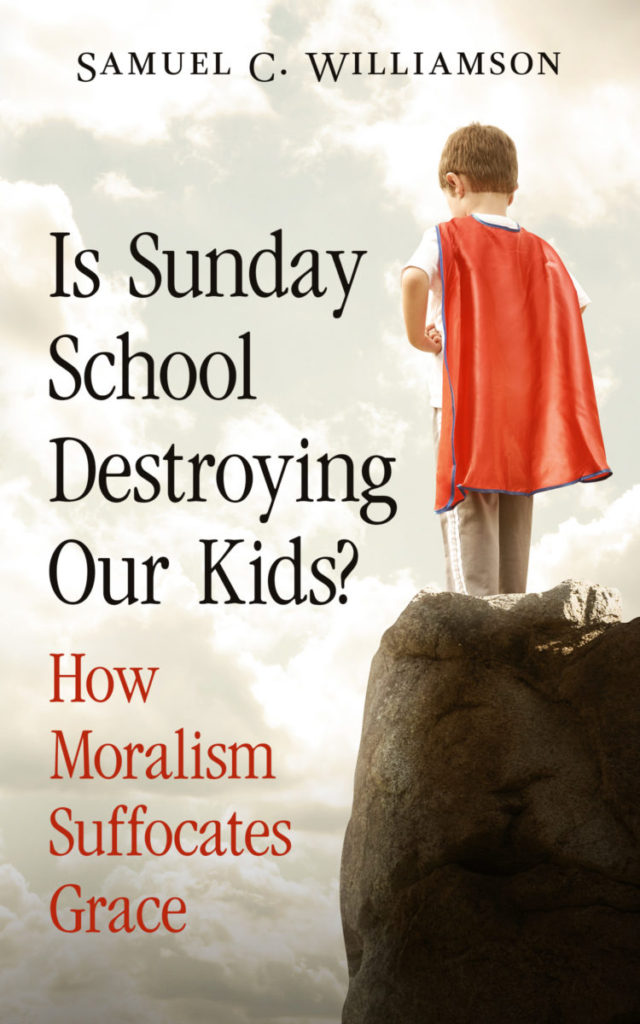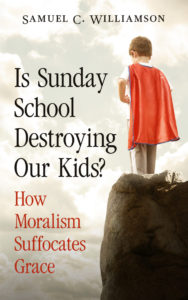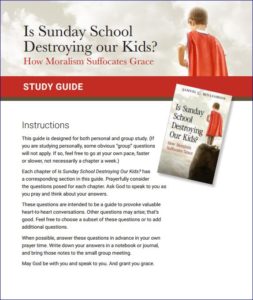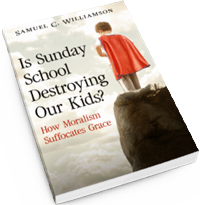Is Sunday School Destroying Our Kids?
What is the difference between Christianity and mere morality?
The world needs morality (oppression thrives when consciences are abandoned) but we need more than morality alone. We need the gospel of grace. A gospel that has largely been lost amid the dos and don’ts and preoccupations of religious culture.

But how do we grow in grow in grace without abandoning morality; and how can we be moral without becoming moralistic, and how do we grow in morality through a grace-fueled life?
Join thousand of other readers who have delighted in this short, story-filled, thought-provoking book on grace. Buy paperback or Kindle versions on Amazon (click the button below).
It’s not just about Sunday school. We can either have a life of drudgery driven by personal performance, or we can have a life overflowing with joy. It’s a book about the lessons we speak to ourselves everyday, and then we speak the same suffocating messages to our children.
How can we live lives ourselves that will stir our children to desire the same joy-filled, grace-overflowing life of wonder?
What People Are Saying
Your book is … probably the simplest one on theology I have ever read, and yet quite profound, really. It made me think, and pray and weep and rejoice. I wish more people would read it. I think it’s much needed in the church today. — Martin
This is the best book I’ve read in a long time (and I read a lot of books). — LH
This is the most brilliant book I have read recently. I feel like I highlighted almost everything, because everything was wonderfully insightful and thought provoking … Thank you very, very much for this substantial book. — Jolene
When I first saw this book, I missed the subtitle, “How Moralism Suffocates Grace“, and thus almost missed one of the best books I’ve read in a l-o-n-g time. It explores why so many of us fall in love with Jesus … and then build structures of rules for ourselves and our children to follow … and then we wonder why our children don’t follow the Lord. Sam helps us return to Christianity. — AR
This book is a must-read for every Christian, whether they are a new convert or a seasoned saint! Sam Williamson has been blessing my life for a long time now through his Beliefs of the Heart website. His writing is both gospel saturated and balanced (which is not as easy to find as you might think). This book is no different. He clearly shows that it is the gospel we need, not more to-do lists or moralistic self-help programs. — Michelle
This is a must read for any parent, Sunday School teacher, or Christian School teacher. Actually, don’t limit it to that way. It is a must read for any person who struggles with sin and can’t overcome it despite huge efforts. — Suzan
I enjoyed this book so much that I want every teacher in my church to read it. This isn’t a book that slams Christian Education programs in the local church (despite the title), but a book that explains the difference between the Good News of Jesus and the yolk of moralism that too many churches place upon their parishioners. — Karla
Additional Resources
Study Guide for: Is Sunday School Destroying Our Kids?
Why does our life feel so fruitless?
Why do we look so unattractive to the world around us?
Where is the promised joy of the Christian life?
How can grace become the theme of our lives?
These are the questions addressed in, Is Sunday School Destroying Our Kids. It’s not just about Sunday school. We can either have a life of drudgery driven by personal performance, or we can have a life overflowing with joy. It’s a book about the lessons we speak to ourselves everyday, and then we speak the same suffocating messages to our children.
Download Study Guide
Frequently Asked Questions:
Click the “Question” and the answer will appear below.
Question: The TITLE of your book (Is Sunday School Destroying Our Kids?) is provocative. Did you mean to take a swing at the tens of thousands of Sunday school teachers who freely volunteer their time?
Answer: We have a problem. Too many of today’s Sunday school lessons simply teach morality (have a good heart like David, or be brave like Samson); but they miss the heart of the gospel. Teaching us to rely on our natural gifts (some of us are more naturally disciplined, or better morally, or have greater willpower) teaches us to rely on ourselves. It teaches an independence. But the gospel teaches us true dependence on God. We should be good, yes, but our righteousness needs to exceed that of the Pharisees, so we need God.
Question: When you authored this book, were you approaching it as a Christian or a non-Christian?
Answer: I am an evangelical Christian, raised in an evangelical home, the son of a pastor and grandson of missionaries to China. I am an orthodox believer, at least I long to be. But too many believers are too quick to criticize the evil world “out there” and too slow to question our own assumption of the gospel. Jesus didn’t go to Rome, decrying Roman debauchery; Jesus came to God’s people, censuring them for their self-righteousness.
Question: In your preface you wrote, “Grace is an ecosystem with interdependent parts. When Yellowstone got rid of its ‘bad’ animals, the good animals began to die too. Similarly, when we rid grace of the parts we don’t like, the good parts also die. Until we understand and embrace all of the interacting elements of grace, we won’t live the joyful, rich life that it promises.” What do you mean by that? Who doesn’t like all of grace? Why wouldn’t they?
Answer: Grace means two things. It means there is an evil inside us that is so sick that the only cure was the sacrifice of the Son of God; and it means that Christ died willingly out of the love he has for us. Some people love the “you are wicked parts” and some people love the “you are loved parts.” But the gospel doesn’t bring us joyful life until we embrace both parts. It is only in admitting the very worst parts of us—and still seeing God’s love—that we begin to know joy.
Question: You open your book with this: “Several years ago I met with a woman distraught over her son’s rejection of Christianity. She said, ‘I did everything I could to raise him right. I taught him to be like the “heroes of faith,” with the faithfulness of Abraham, the goodness of Joseph, the pure heart of David, and the obedience of Esther.’ She wondered why he had rejected Christianity. I wondered why it took him so long.” Aren’t you being harsh? What is so bad about wanting to live good lives like the heroes of the faith?
Answer: There is nothing wrong with wanting to be a good person like our heroes of the faith. It’s just not the gospel. When we teach our kids to be good—hurray! May they be great citizens on this earth! But there is an insidious danger in moral teaching. There’s a danger that they will hear, “Have a good heart like David, and so God will love you.” We only recognize God love when we admit our failures and his forgiveness; not when we try to be good so God will love us. God’s love is the initiative, our goodness is the response.
Question: You write, “Most religions believe in mostly the same moralities. So what distinguishes Christianity?” What do you mean by that?
Answer: Most ancient moral thinkers—Babylonian, Egyptian, Greek, Norse, Confucian and more—taught similar morals about marital fidelity, truth telling, and integrity. The difference between other religions and the gospel is that the gospel standard of morality is higher, and the gospel says we can’t do it. We need the grace and empowerment of God.
Question: You wrote, “The wonder of the gospel is not the love of the beautiful; it’s that Beauty kisses the Beast.” How can a fairy tale help us understand the gospel?
Answer: There is a great children’s Bible with the subtitle, Every Story Whispers His Name. If you look at stories throughout history, almost every story reveals something about spiritual reality and human longing (if we look right). Beauty and the Beast shows a beauty kissing a beast—that is the message of beautiful Christ wooing ugly sinners; the legend of King Arthur is the story of a people longing for a king to save them (I bet you recognize that analogy); and modern day superhero movies always have a hero risking his life against an unbeatable foe—Christ didn’t just risk his life, he lost it.
Question: Are you honestly saying our kids shouldn’t go to Sunday school?
Answer: Naw. I don’t mean that. I went to Sunday school, my kids did, and I’ve taught Sunday school. I suggest we take any help we can get. But! Let’s make sure we are teaching grace and the gospel of Jesus, and not the Nike gospel of, Just Do It. We need to teach our desperate need of God.
Question: In the second chapter you say, “Why do so many people—with incredible conversions—parent children who leave Christianity? History overflows with great saints whose offspring lost faith.” What do you have to say to this huge problem of children leaving the church?
Answer: In Marks of the Messenger, author Mack Stiles shows the simple formula of how the gospel is lost: the gospel is accepted, then assumed, then confused, and then lost. Too many of us have great conversion stories, our lives are changed, and then we primarily teach the changed life behaviors. Yes, morality is good; but teaching behavior isn’t the gospel. And it’s not what saved us. Jesus says we need to clean the inside of the cup not just the outside. Our moralism teaching looks to external behavior; the gospel looks at internal heart change.
Question: You dedicate a whole chapter to Esther, yet in the third chapter you say, “Esther is beloved. Many think she was forced into sexual slavery. I think she was a complicit adulterer.” Are you gratuitously tarnishing a true hero of the faith?
Answer: I don’t want to tarnish anyone, especially Biblical characters. And I don’t have to. Just look at what the Bible says about them. God doesn’t choose people because they are good; they only become good as they accept God’s truth. So the Bible always tells “the rest of the story.” And the rest of the story of our heroes isn’t so hot: Abraham was an idol worship and a deceiver; Joseph was insensitive, maybe narcissistic; David an adulterer; and Esther had sex while unmarried with a non-believer. But God pursued and rescued all of them.
Question: In chapter 6 you seem to attack the Christian publishing world. You say, “This is the evangelical world: we began with the Spirit and end with a to-do list.” What do you mean by that?
Answer: The Pharisees summarized all the rules in the Bible and came up with about 613 rules. I scoured the websites of Christian publishers until I found several thousand do’s and don’ts (Seven Steps to a Healthy Marriage, or family, or church, etc.). We claim we love the gospel, but mostly we just write about tips and techniques. What makes us different from the secular world (except we occasionally “baptize” our to-do lists with some spiritual sayings)?
Question: The title of your seventh chapter is, The Ugliness of Religious Righteousness. How can righteousness be ugly? So are you saying we can behave anyway we want, because God will love us and forgive us?
Answer: But lots of religious righteousness IS ugly. That’s what so shocked the world of Jesus; that he would hang around the pimps and prostitutes. The “religious” of the time showed an ugly nature when they prayed, “Thank you God that I’m not like this tax collector….” Our self-righteousness is ugly.
Question: If grace is the answer AND we want everyone to be moral, what is the answer?
Answer: Much of our morality comes from feeling good about ourselves because, “I’m not THAT kind of person.” The world needs morality, but we also need humility; knowing that we very well could be that kind of person, if not for the grace of God.
Question: In chapter 10, you seem to belittle willpower. You write, “External ‘sins’ arise from inner forces. There is a stimulus beneath the sin. Our constant complaining, anxiety, and frustration are the result of inner pressures on the heart. Willful repression of external sin does nothing to relieve that inner pressure.” Are you saying that we shouldn’t use willpower to avoid sin?
Answer: I say we should use ever arrow in our quiver to avoid immorality, including willpower, small groups, confession of sin to others, and accountability groups. We just can’t rely wholeheartedly on them. They are like training wheels that keep us upright as we learn inner poise. We need to learn inner poise—like the fruit of the Spirit which we only get from God—because someday the training wheels are coming off.
Question: In the last chapter you address how we can be deeply moral, yet you seem to take a swing at the church. You say, “Jesus said that the church would be filled with wheat and weeds (Matt. 13: 24– 30). We suspect that those hypocritical weeds are the adulterers and thieves hidden among us, and we think the wheat are the good people. Like us. But Jesus says that many of the “weeds” actually do good deeds … and these people flock to our churches.” Are you saying that weeds or tares in the churches might be the good, moral people?
Answer: It’s not what I say but what Scripture says. Jesus said that there will be wheat and tares (or weeds) in the church, and that many of the weeds will be people who did great deeds in Christ’s name, or gave money, or lived “good” lives. This should scare us (it does me). It means that some of our good deeds aren’t done for “Goodness’ sake” but for our own desire to feel good about ourselves. We need God’s grace!
If you want a PDF of these Frequently Asked Questions (FAQ’s) for a group discussion, Click here:
Popular Quotes from: Is Sunday School Destroying Our Kids?
The wonder of the gospel is not the love of the beautiful; it’s that Beauty kisses the Beast.
The Beast isn’t loved because he has changed; the Beast is changed when he is loved. Joy doesn’t come when he’s loved for his beauty; joy overwhelms him when he is loved in his hideousness.
Most religions believe in mostly the same moralities. So what distinguishes Christianity? We need the gospel. The gospel exceeds mere morality.
In the Garden of Eden, God gave one rule. It would fit on a Chinese fortune cookie: Don’t eat from that tree. And we blew it. Do we really think God said to himself, “I know the problem with the Bible so far: it doesn’t have enough rules”?
Why do so many people—with incredible conversions—parent children who leave Christianity?
Our kids reject Christianity because they can’t distinguish it from mere morality.
Why do we paint our biblical heroes more heroically than the Bible does? Hiding the faults of our heroes robs us of grace. That’s why the Bible doesn’t hide them.
The message of the gospel—the entire storyline of Scripture—is God’s loving pursuit of people who run from him as fast as they can and who live lives unworthy of his love. That’s why it’s called grace.
God didn’t come to earth to give us more moral blueprints or doctrinal design plans. He shed his blood to make us friends, co-laborers in his construction project. God wants friends, not independent contractors.
Self-reliance on willpower has only two results: misery when we fail or smugness when we succeed.
Like Yellowstone, grace is an ecosystem with interdependent parts. When Yellowstone got rid of its “bad” animals, the good animals began to die too. Similarly, when we rid grace of the parts we don’t like, the good parts also die. Until we understand and embrace all of the interacting elements of grace, we won’t live the joyful, rich life that it promises.
I’ve witnessed dozens of families (and churches, ministries, and prayer groups) who began with a furious fire of love for God but whose next generation couldn’t blow a smoke ring.
God can make the littlest great, but he can’t use the greatest until we become little.
This is the evangelical world: we began with the Spirit and end with a to-do list.
But in our morality, we need to be cautious. Sound moral behavior apart from the gospel can lead us—ever so slowly—to feel good about ourselves, which can lead us—ever so slowly—to self-righteousness. Which is the enemy of the gospel.
“I don’t care what others think of me; I only care what I think of me.” It sounds like freedom. The opinions and agendas of others no longer control us. That’s good. But think with me a moment. Does it comfort us to claim our high jump bar is so low that we can trip over it and still win the blue ribbon?
Restraints are like training wheels. They keep us upright as we develop an inner poise. But in a moment of mechanical failure, the wheels may fall off and we crash. How dare we disparage our friends when their training wheels break! Our friends may actually have more inner poise than we do—just not enough to stay upright on their own.
The opinions of others do matter. It just depends on who the other person is.
Paperback, Kindle, and Audible versions are available on Amazon: Is Sunday School Destroying Our Kids?



